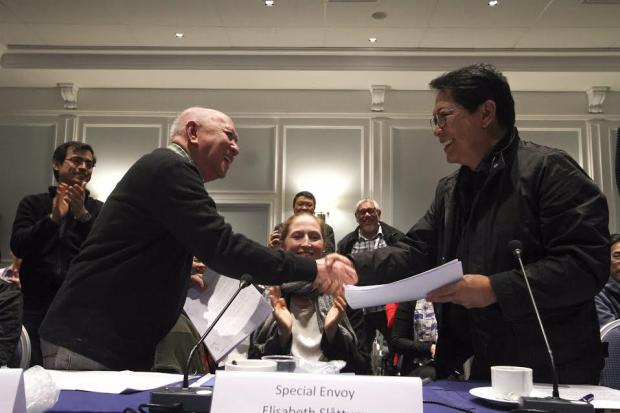PH gov’t, communists urged to pursue talks even without ceasefire

Chief peace negotiators Fidel Agcaoili of the NDFP and Silvestre Bello III of the Philippine government shake hands after signing supplemental guidelines for the conduct of peace talks. Looking on is Elisabeth Slattum, Norwegian special envoy. (Photo by KARLO MANLUPIG/Inquirer Mindanao)
DAVAO CITY — Can parties in conflict negotiate and reach agreements even without a ceasefire?
A consultant of the National Democratic Front of the Philippines said that the issue on the withdrawal of the unilateral ceasefire declarations should not be a reason to totally suspend the peace negotiations between the revolutionary movement and the Philippine government.
President Duterte on Friday withdrew the government’s indefinite unilateral ceasefire following the announcement of the New People’s Army to end its own ceasefire effective February 10.
The NPA cited President Duterte’s refusal to release 400 political prisoners and the continuing presence of government forces in the communities as reasons it terminated its ceasefire.
Randy Malayao of the NDFP told the Philippine Daily Inquirer that despite the absence of any ceasefire orders during the terms of former Presidents Fidel Ramos, Joseph Estrada, Gloria Macapagal-Arroyo and Benigno Aquino III, several important agreements and documents were signed.
Article continues after this advertisementDuring the time of Ramos, at least eight agreements were signed after the formal talks was initiated following the collapse of the attempt to negotiate during the administration of Corazon Aquino.
Article continues after this advertisementDuring the exploratory talks between the NDFP and the Ramos administration, both agreed on the The Hague Joint Declaration in September 1, 1992.
This agreement serves as the foundation of the negotiations where parties agreed to tackle in a successive manner the different substantive agenda including human rights and international humanitarian law; socio-economic reforms; political and constitutional reforms; and the end of hostilities and disposition of forces.
Major breakthroughs, in the absence of a ceasefire, were also achieved from 1994 to 1995 when both peace panels agreed to sign three essential documents including The Breukelen Joint Statement of June 14, 1994; the Joint Agreement on Safety and Immunity Guarantees (JASIG) of February 24, 1995; and the Agreement on the Ground Rules of the Formal Meetings of February 26, 1995.
Following the start of the formal talks in 1995, both parties signed the Additional Implementing Rules Pertaining to the Documents of Identification in June 26, 1996, the Supplemental Agreement to the Joint Agreement on the Formation, Sequence and Operationalization of the Reciprocal Working Committees in March 18, 1997 and the Joint Agreement in Support of Socio-economic Projects of Private Development Organizations and Institutes in March 16, 1998.
The Additional Implementing Rules of the JASIG Pertaining to the Security of Personnel and Consultations in Furtherance of the Peace Negotiations were also signed in March 16, 1998.
“Under Ramos, the Comprehensive Agreement on the Respect for Human Rights and International Humanitarian Law, the first in the four substantive agenda, was forged. It was signed though during the term of President Estrada. There was no ceasefire then,” Malayao said.
Several joint statements were signed during the Arroyo administration where the past agreements were reaffirmed.
One of the major developments during Arroyo’s presidency was the signing of the Joint Monitoring Committee that puts into action the monitoring of human rights abuses.
It was also during the Arroyo administration when both parties signed a memorandum of understanding with the Royal Norwegian Government as the third party facilitator.
During the term of President Aquino, a joint communique and a joint statement were inked to reaffirm the previously signed agreements until the talks hit a snag and was in impasse by the time Duterte was elected.
A source involved in the peace process, who requested anonymity for not having been authorized to speak publicly on the issue, said that while a ceasefire would create better conditions for the negotiations, the entire peace process should not be doomed just because both parties could not immediately address unresolved issues on the temporary cessation of hostilities.
“There are other more significant substantive agenda that are being discussed on the table. And these, the CASER (Comprehensive Agreement on Socio-Economic Reforms) and the CAPCR (Comprehensive Agreement on Political and Constitutional Reforms), are the much-needed reforms that would address the causes of this conflict,” the source said.
The source, however, said that forging a bilateral ceasefire agreement would accelerate further the present peace process adding that optimism had been high between two parties that a final peace agreement could be achieved under the present government.
Royal Norwegian Government Special Envoy Elisabeth Slattum, during the closing ceremony of the third round of talks between the Philippine government and the National Democratic Front of the Philippines in Rome last January 25, said that setbacks including clashes were expected.
The statement came after government forces and communist guerrillas clashed in North Cotabato as talks were being held in Rome.
“I have yet to witness a peace process where there have not ever been ups and downs, a peace process that has not been messy, where there haven’t been any clashes on the ground or violations of ceasefire or publicly expressed frustration,” Slattum said.
Peace remains the only way even if negotiations become extremely challenging, according to Slattum.
“In those difficult moments we have to remind ourselves that … the way to deal with these challenges is by meeting, by dialoguing, talking, discussing, arguing. This is the only way to move forward here at the negotiations table,” Slattum said. SFM